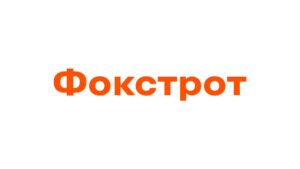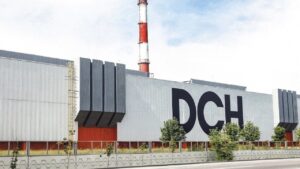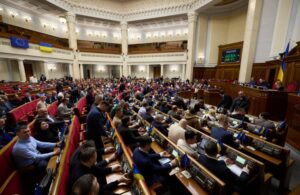
Ukraine’s largest home appliance and electronics retailer Comfy paid UAH 1.2 billion to the state budget in January-September 2024, the same amount as the company paid last year in total.
According to the company’s press service, revenue for this period increased by 30%, the dynamics of the company’s performance was influenced by the expansion of the network, updating store formats and product range, and improving customer experience.
This year, the retailer opened seven new stores, in particular in Oleksandria, Berdychiv, Khodosivka, Mohyliv-Podilskyi, restored stores damaged by Russian missiles (in the Dnipro shopping center Apollo and the shopping center “Sun Gallery” in Kryvyi Rih), and renovated the flagship store (1000+ sq. m.) in the capital’s Ocean Plaza shopping center. In addition, Comfy has reformed 80% of its existing stores to meet changing demand and assortment.
Thanks to the active development, Comfy created about 500 jobs across Ukraine.
By the end of the year, the retailer plans to open four more new stores and 100% upgrade its network according to the new standards.
The company’s sales growth was driven by the renewal and expansion of its assortment. The largest growth is traditionally observed in the categories of large appliances, small appliances and accessories. Prolonged power outages caused a boom in demand for alternative power sources, with an increase of over 1300%.
The retailer has also joined the National Cashback program, and since the start of the project, more than 100 manufacturers with whom the company cooperates have joined the program, offering more than 3.3 thousand units of goods.
In total, as of November 2024, the COMFY offline network has 109 stores.
The chain is owned by Comfy Trade LLC (Dnipro). According to the Unified State Register of Legal Entities and Individual Entrepreneurs, the owner of Comfy Trade is Comfy Holdings Limited (Cyprus), with Svitlana Gutsul and Stanislav Ronis as the ultimate beneficiaries.

Omnichannel retailer Foxtrot paid UAH 700.5 million in taxes in January-September 2024, exceeding the total amount of taxes paid last year by almost a quarter, the company’s press service reports.
The release clarifies that the company’s turnover (20%) and website traffic (21%) also increased proportionally.
Given the seasonality (which lasted for a long time in the third quarter), the top sellers were charging stations (up almost 10 times compared to the same period last year), air conditioners (+141%), and fans (+135%).
GSM devices (smartphones, tablets, smartwatches) showed moderate growth during the Back-to-School period – by 32%, laptops – by 21%, headphones – by 22%, printers – by 37%.
During the third quarter, Foxtrot opened three new stores. The renovations were carried out in the chain’s stores in Bila Tserkva (Hermes shopping center), Sambir and Odesa (City Center shopping center). The key changes in the renovations included the replacement of commercial equipment, product placement, lighting, and interior design with elements of “embroidery”. In addition, when creating new and renovating existing stores, the company pays attention to creating inclusive retail spaces. In particular, Foxtrot has integrated DEAF ID (a unique electronic identification card for people who are deaf) into the FoxFan loyalty program for customers with hearing impairments.
“Foxtrot is one of Ukraine’s largest omnichannel retail chains in terms of the number of stores and sales of electronics and household appliances. The company operates 123 stores in 67 cities, including the frontline cities of Kherson, Kramatorsk and Sloviansk, and an online platform Foxtrot.ua and a mobile application of the same name.
The Foxtrot brand is developed by the Foxtrot group of companies. The co-founders are Valery Makovetsky and Gennady Vykhodtsev.

In January-September this year, Metinvest Mining and Metallurgical Group, including its associates and joint ventures, increased its payments to the budgets of all levels in Ukraine by 38% year-on-year to UAH 15.2 billion.
According to the company’s press release on Tuesday, Metinvest remains a pillar of the country’s economy amid the full-scale war.
Among the largest payments is the fee for subsoil use, which increased 2.8 times compared to the first and third quarters of 2023, to UAH 4.2 billion. The Group also increased its unified social tax payments by 16% to UAH 2.8 billion. In addition, Metinvest paid UAH 2.5 billion in personal income tax to the budget, up 11% compared to the first three quarters of 2023.
Land payments in January-September 2024 increased by 6% year-on-year to UAH 948 million, and environmental tax by 21% to UAH 543 million. At the same time, income tax payments decreased by 32% to UAH 1.9 billion.
“In a time of war, paying taxes is critical to supporting the Ukrainian economy. The main task of our company is to strengthen the country’s defense capabilities by all means available: to be a reliable employer, investor, manufacturer of steel products for the frontline and supplier of ammunition and equipment to the Armed Forces. Only by working together can we create a solid foundation for Ukraine’s victory and ensure a peaceful future for Ukrainians,” said Yuriy Ryzhenkov, CEO of Metinvest.
As reported earlier, Metinvest increased its tax payments to the state budget by one and a half times to UAH 10 billion in the first half of 2024. In 2023, the company paid UAH 14.6 billion to the state budget.
“Metinvest is a vertically integrated group of steel and mining companies. The group’s enterprises are mainly located in Donetsk, Luhansk, Zaporizhzhia and Dnipro regions.
The main shareholders of the holding are SCM Group (71.24%) and Smart Holding (23.76%), which jointly manage it.
Metinvest Holding LLC is the management company of Metinvest Group.

In January-September of this year, businessman Alexander Yaroslavsky’s DCH Group increased its payments to the budgets of all levels by 14.5%, or UAH 210 million, compared to the same period last year, to more than UAH 1.65 billion.
According to the PR department of DCH, the total amount of taxes paid by the group’s companies since the beginning of Russia’s full-scale invasion has reached almost UAH 5.5 billion.
It is specified that the main increase in tax payments compared to 9 months of 2023 was provided by JSC Bank Credit Dnipro – by UAH 95 million, Kharkiv Tractor Plant (HTZ) – by UAH 32 million, and ORANTA Insurance Company – by UAH 70 million.
It is also reported that in particular, in January-September 2024, DMZ reduced the production of rolled metal products by 56.9% compared to the same period last year, while the production of metallurgical coke decreased by 0.4%.
In the first 9 months of 2024, Sukha Balka Mine commissioned 8 new blocks with total reserves of 906 thousand tons of ore.
Since the beginning of Russia’s full-scale invasion of Ukraine, KHARTSYZSK PIPE has been in the war zone and the plant’s territory has been under constant shelling. Nevertheless, KHARTSYZSK PIPE continues to maintain production, electricity, gas and water supply to the plant and the city area, and continues to produce machinery for agriculture and the country’s critical infrastructure.
In June of this year, Bank Credit Dnipro, together with the Independent Association of Banks of Ukraine and 18 major commercial banks, signed a memorandum of bank lending for energy infrastructure rehabilitation projects, which is dictated by the country’s strategic need to ensure energy independence.
A significant challenge for manufacturing companies is the outflow of personnel, in particular due to the mobilization of personnel. Since the beginning of the war, 465 employees of Sukhoi Balka and 268 employees of DMZ have joined the Armed Forces of Ukraine. The companies’ operations are also affected by periodic power outages, when they have to reduce or stop production completely.
Today, DCH Group employs over 7.6 thousand people. 912 employees of the group serve in the Ukrainian Armed Forces, 55 of those who joined the ranks of the Armed Forces were killed.
DCH Investment Management is a financial and industrial group of companies that manages investments in ore mining and metallurgy, machine building, real estate, insurance, banking and hospitality.

The new French government wants to reduce the budget gap by 60 billion euros in 2025 and is preparing a temporary tax increase.
The new French government has announced a decision to raise taxes starting in 2025. The Minister of Finance Antoine Armand said this on RTL radio.
The draft budget for 2025 with specific proposals is to be released on October 10.
The goal of the French authorities is to reduce the budget deficit by 60 billion euros. This is partly planned to be done by cutting spending (by €40 billion) and partly by increasing budget revenues.
“As soon as we manage to cut spending significantly, we will need exceptional and temporary help from those with very high incomes,” Arman said. He assured that people with low and middle incomes will be exempt from the additional fiscal burden: “The income tax rates for those who go to work every day will not change.”
His government colleague, Laurent Saint-Martin, Minister of Budget and Financial Accounts, said on France 2 on Thursday that only 0.3% of the population will feel the tax increase – the richest households in France, those without children and earning an annual income of 500,000 euros.
The tax increase will also affect the largest companies.
Earlier this week, French Prime Minister Michel Barnier warned that the current financial situation in the country is a sword of Damocles hanging over every French citizen. “We need to act now to ensure a stable financial future for our country. Our debts exceed €3.2 trillion, and this is a situation we cannot ignore,” he said.
In September 2024, for the first time since the global financial crisis, the yield on French government bonds exceeded that of Spanish securities. The reason is that the budget deficit in France is too high.
Last year, it was 5.5% against the planned 4.9%, and this year it may reach 6%, which is much higher than the European Union’s limit of 3%. At best, France will be able to return to the target no earlier than the end of this decade.
Trends in the global and Ukrainian economies can be tracked via the Experts Club information and analytical channel – https://www.youtube.com/@ExpertsClub

A revised draft law on tax increases during wartime (No. 11416-d) was registered in the Verkhovna Rada on Friday, the parliament’s website reports.
The text of the draft law on amendments to the Tax Code of Ukraine regarding the peculiarities of taxation during martial law is not yet available on the website.
The draft law is authored by MPs Danylo Hetmantsev and Andriy Motovylovets (Servant of the People faction) and Oleksandr Lukashev (Restoration of Ukraine parliamentary group).
As reported, the Parliamentary Committee on Finance, Taxation and Customs Policy recommended that the Verkhovna Rada adopt as a basis the revised draft law on raising tax rates.
According to Committee Chairman Hetmantsev, the draft law provides for an increase in the military tax rate from 1.5% to 5%, setting the military tax at 1% of income for individual entrepreneurs (IEs) for single tax payers of group III and at 10% of the minimum wage for single tax payers of groups I, II and IV.
LAW, PARLIAMENT, TAX